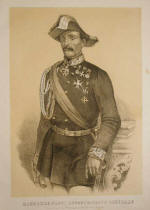Manfredo Fanti facts for kids
Manfredo Fanti (born February 23, 1806 – died April 5, 1865) was an important Italian general. He is famous for helping to create the Royal Italian Army. This army played a big part in uniting Italy into one country.
Contents
Early Life and Military Career
Manfredo Fanti was born in a town called Carpi, in Emilia-Romagna, Italy. He went to a military school in Modena to study.
In 1831, he was involved in a movement to change the government. Because of this, he had to escape to France. There, he joined the French army as an engineer.
Later, in 1833, he joined Mazzini in an attempt to invade Savoy. This plan did not work. In 1835, Fanti went to Spain. He fought for Queen Christina against a group called the Carlists. He stayed in Spain for 13 years. During this time, he showed great bravery and became a high-ranking officer.
Return to Italy and New Battles
In 1848, a war started between Piedmont and Austria. Fanti quickly returned to Italy. At first, his help was not wanted by the governments. But soon, he was given command of a group of soldiers from Lombardy.
During this time, King Charles Albert faced a difficult situation. His army was defeated, and the people of Milan were upset. Fanti's courage and smart decisions helped calm things down.
In 1849, he was chosen to be a member of the Piedmontese Parliament. When the war started again, he led his Lombard soldiers.
Challenges and the Crimean War
After Piedmont lost the Battle of Novara in March 1849, peace was made. But then, a rebellion broke out in Genoa. Fanti worked hard to stop his soldiers from joining it.
Some higher-ranking officers in Piedmont did not trust Fanti. They thought he was too close to Mazzini. He was even put on trial for his actions during the war. But he was found innocent. Still, he was not given another job until the Crimean War in 1855.
Uniting Italy: A General's Role
In 1859, during the Second Italian War of Independence, Fanti led the 2nd Division. He helped win important battles like Palestro, Magenta, and Solferino.
After the war, he was sent to organize the army of the United Provinces of Central Italy. This army was made up of soldiers from different Italian regions. In just a few months, he trained 45,000 men. Their job was to be ready to act if a revolution started in the Papal States.
Fanti was a skilled leader. He managed to avoid problems between different political groups. He stopped Giuseppe Garibaldi from attacking Rome too early. This led to Garibaldi leaving his command.
In January 1860, Fanti became the Minister of War and Marine. He worked for Cavour, the Prime Minister. Fanti combined the regional armies with the Piedmontese army. He started many important changes to make the army stronger.
Conquering the Papal States
Meanwhile, Garibaldi had invaded Sicily with his famous Redshirts. King Victor Emmanuel II decided it was time to get involved too.
Fanti was given command of two army groups. They invaded the Papal States. They captured Ancona and other strongholds. They also defeated the Papal army at Castelfidardo. The enemy commander, General Lamoricière, was captured.
In just three weeks, Fanti conquered the regions of Marche and Umbria. He also took 28,000 prisoners. When the army entered Neapolitan territory, the King took overall command. Fanti became his chief of staff.
Later Years and Legacy
After defeating a large force at Mola and helping with the siege of Gaeta, Fanti returned to his job in Turin. He continued to work on army reforms.
He played a key role in ending Garibaldi's volunteer army. Fanti believed in a professional, conscription-based army. Only a small number of Garibaldi's officers joined the new Royal Italian Army. This caused disagreements in parliament.
When Cavour died in June 1861, Fanti resigned from his position. He was no longer actively involved in the Italian Army. Many of his reforms were later changed by others.
Manfredo Fanti's health declined, and he passed away in Florence on April 5, 1865. He is remembered as a key figure in the creation of the modern Italian army.
See also
 In Spanish: Manfredo Fanti para niños
In Spanish: Manfredo Fanti para niños
 | Claudette Colvin |
 | Myrlie Evers-Williams |
 | Alberta Odell Jones |


